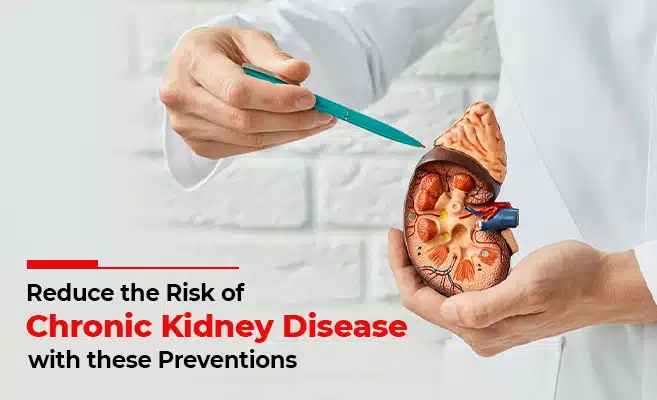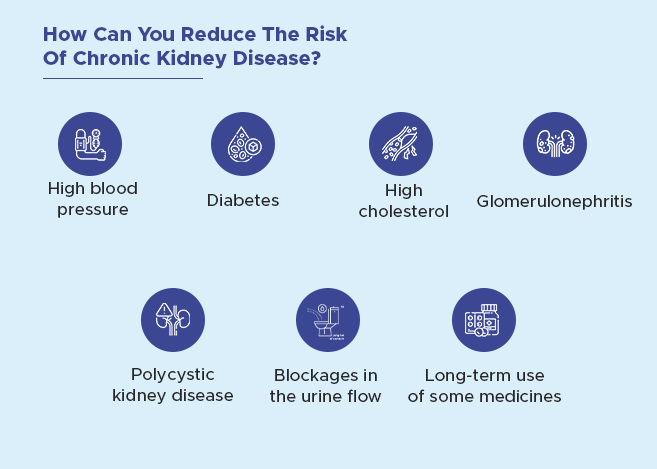How Can You Reduce The Risk Of Chronic Kidney Disease?

Chronic Kidney Disease (CKD) occurs when your kidneys fail and cannot filter blood properly. The condition is referred to as “chronic” because the injury to your kidneys occurs gradually over time. Wastes might accumulate in your body as a result of this injury. Other health issues might arise as a result of CKD.
The kidneys are a pair of fist-sized organs at the rib cage’s bottom side. Each kidney is on both sides of the spine. Kidneys are essential for having a healthy body. They help filter impurities from the blood, such as waste products, excess water, and more. All the toxins removed from blood are stored inside the bladder and removed while people urinate.
The kidneys help regulate the body’s pH, salt, and potassium levels. They are responsible for producing hormones that help regulate blood pressure and control the building of red blood cells. Some people suffer from kidney-related issues such as chronic kidney disease if they do not take proper care of it.
In this blog, let’s learn more about how to reduce the risk of CKD, its symptoms, and much more.
What are chronic kidney diseases?
Chronic kidney disease (CKD) is a long-term condition in which the kidneys don’t work properly as they should. It is a common condition often found when people get older. It can affect anyone; however, it’s more common in older people. CKD can get worse over time, and eventually, the kidneys might stop functioning altogether, but this is uncommon. Several people with CKD can live quite long with the condition.
What are the Symptoms of Chronic Kidney disease?
CKD doesn’t show signs and symptoms until most of the kidney becomes diseased. Once the kidney is severely damaged, the symptoms of CKD might include the following:
- swelling around the eyes, called periorbital edema
- swelling of the legs, known as pedal edema
- fatigue
- shortness of breath
- nausea
- vomiting in the morning and after eating food
- a urine-like odor from the breath
- bone pain
- abnormally dark or light skin
- an ashen cast to the skin called uremic frost
- drowsiness
- mental cloudiness
- numbness in the hands and feet
- restless leg syndrome
- brittle hair and nails
- itching
- weight loss
- a loss of muscle mass
- muscle twitching and cramps
- easy bruising and bleeding
- blood in your stools
- hiccups
- excessive thirst
- impotence
- insomnia
- sleep apnea, and more.
Causes of Chronic Kidney Disease
CKD is usually caused by other conditions that make the kidneys diseased. Often, it’s the result of a combination of multiple problems. It can be caused due to the reasons mentioned below.

5 Stages of Chronic Kidney Disease
- Stage 1 (GFR > 90) – Kidney damage with normal filtering ability
- Stage 2 (GFR 60-89) – Mild reduction in kidney function
- Stage 3 (GFR 30-59) – Moderate reduction in kidney function
- Stage 4 (GFR 15-29) – Severe reduction in kidney function
- Stage 5 (GFR <15) – Kidney failure requiring dialysis or transplant
How to Reduce the Risk of Chronic Kidney Disease?
CKD can only sometimes be prevented; however, people can take steps to reduce the chances of getting the issue. Mentioned below are some of the effective tips to use for reducing the risk of chronic kidney disease.
Managing the Underlying Conditions
If an individual has a long-term condition that could lead to chronic kidney disease CKD, for instance, diabetes or high blood pressure, this must be managed and taken properly care of. People should follow the advice of their healthcare provider, take the prescribed medication, keep all appointments relating to the problem, and so on.
Stop smoking
Smoking increases the risk of having cardiovascular disease, such as heart attacks or strokes, which is linked with a higher chance of CKD. If people quit smoking, they can improve their general health and reduce the risk of having this severe condition.
Healthy diet
A healthy, nutritious, and balanced diet can help reduce kidney disease risk by keeping blood pressure and cholesterol at a maintained level. A balanced diet must include the following:
- There are a lot of fruit and green vegetables, at least five portions daily.
- Meals that include starchy foods, like whole grain bread, potatoes, rice, pasta, and more.
- Some dairy products or alternatives to them.
- Beans or pulses, fish, eggs, meat, and so on are a source of protein.
- Low and maintained levels of salt, sugar, and saturated fat.
Exercise regularly
Regular exercise helps lower blood pressure and reduce the risk of developing kidney disease. At least 150 minutes (2 hours and 30 minutes) of moderate-intensity aerobic activities, such as cycling, fast walking, and more, every week is recommended, as well as strength exercises on two or more days a week that work all the major muscles in the body.
Be careful with painkillers.
Kidney disease can be caused by taking too many non-steroidal anti-inflammatories (NSAIDs), such as aspirin and ibuprofen, or taking them for longer than recommended. If an individual needs to take painkillers, they should be sure to follow all the instructions that come with the medicine.
Manage consumption of alcohol.
Drinking too much alcohol can increase blood pressure and add extra calories. It can lead to weight gain. People who drink alcohol should limit themselves while drinking. Women can intake one drink per day, and men should have two drinks per day. One drink is equal to 5 ounces of wine, 12 ounces of beer and 1.5 ounces of liquor.
How is CKD Treated?
There is no cure for chronic kidney disease; however, some steps can be taken in early CKD to preserve a higher level of kidney function. Mentioned below are some of the steps that can be taken to treat CKD.
- Make and keep the healthcare provider or kidney specialist visits regularly.
- Maintain the blood sugar if suffering from diabetes.
- Avoid taking painkillers and other medications that may cause kidney disease.
- Maintain blood pressure levels.
- Consult a dietitian regarding beneficial changes in diet. Dietary changes may include limiting protein, eating foods that reduce blood cholesterol levels, limiting sodium and potassium consumption, and more.
- Quit smoking.
- Treat anemia (if suffering).
- Be active every day and exercise during the week.
- Maintain a healthy weight.
The Bottom Line
Chronic kidney disease can range from a mild condition where people will have no or few symptoms to a severe condition in which the kidneys stop working, sometimes called kidney failure. You can visit the Best Kidney hospital in Delhi for regular checkups. People suffering from any issues associated with the kidneys must visit and consult the healthcare providers at PSRI Hospital – 84 84 84 84 17.
FAQs
Q: What is chronic kidney disease (CKD)?
A: CKD is a condition where the kidneys gradually lose their ability to filter waste and excess water from the blood. This damage to the kidneys happens slowly over time.
Q: What causes chronic kidney disease?
A: The main causes of CKD are diabetes, high blood pressure, glomerulonephritis (kidney inflammation), polycystic kidney disease, blocked urine flow, and long-term usage of certain medications like lithium.
Q: How can I reduce my risk of getting chronic kidney disease?
A: To lower your CKD risk, control underlying conditions like diabetes and high BP, quit smoking, eat a healthy diet rich in fruits/veggies, exercise regularly, limit alcohol, and avoid overusing painkillers.
Q: What are the early symptoms of chronic kidney disease?
A: Early CKD may not show obvious symptoms. As it progresses, symptoms can include swollen eyes/legs, fatigue, nausea, uremic breath odour, muscle cramps, itchy skin, and sleep issues.

 Book An Appointment
Book An Appointment Virtual Consultation
Virtual Consultation




